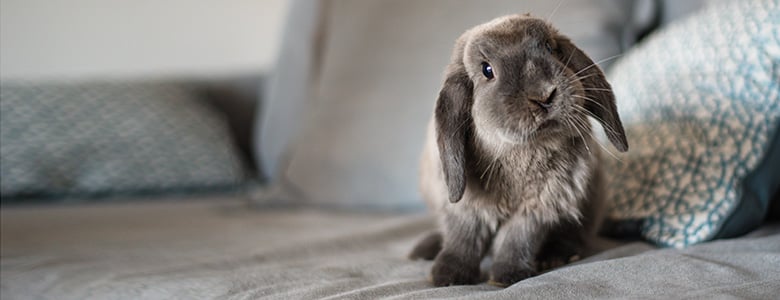Easter is often a time for chocolate, and bunnies! But regrettably, a number of baby bunnies purchased during this festive holiday end up abandoned. Why? Because owners don’t properly understand the needs of this special pet.
Caring for your bunny: the basics
Contrary to popular belief, a bunny rabbit needs a lot of space. They should not be left in their cage at all times, but instead should have the freedom to wander around the house when you’re home. This way, they get some exercise and can have a little fun. Ideally, you should leave them in a large closed-off space when you’re not home and cannot keep an eye on them.
Litter
- Compressed paper makes for ideal litter, so why not opt for litter made from recycled paper?
- Wood-pellet litter for rabbits and rodents can be irritating for certain bunnies, but others may have no issue with them.
- The litter box should be placed somewhere where the bunny would normally go to do their business.
- Teach your bunny the basics of cleanliness!
Diet
- Opt for good quality hay and allow them to serve themselves.
- Try giving them green vegetables like lettuce, celery, fine herbs, zucchini, endives, etc.
- If you feed your bunny chunks, make sure they contain at least 18% fiber.
- Chunks should be given in controlled quantities to avoid weight gain and health issues.
- Hay should form the main part of their diet, with feed serving as a meal compliment.
- Lastly, give them fruit like apples, strawberries, pears and mangos as a treat, but make sure to do so in moderation.
Maintenance
- Make sure they get their regular manicure and pedicure! Trimming their nails is an easy task — just ask around for some best practices first! If you don’t feel comfortable doing it, a number of places, including veterinarian clinics, will gladly perform the service. Be careful when holding your bunny — squirming could result in injury!
- Brushing during shedding season will help remove excess fur, preventing your pet from swallowing it. When consumed in large quantities, fur can result in digestive problems.

Tips for training and proper behavior
It’s important that you supervise your pet’s behavior and raise them as you would raise a cat or a dog. Ensure there are never any cords, wires or plants laying around, and teach them, for example, not to chew on chair legs! Instead, give them some fun toys that allow them to satisfy their desire to chisel, scratch, dig and hide. You can make these toys at home, or easily find them in stores.
Sterilization
Like the majority of pets, bunnies should be spayed and neutered. They are extremely territorial animals and hormones are at the heart of their behavioral problems. Getting them spayed or neutered will mean they’ll be less likely to urinate all over the house, and they’ll have the same temperament among their peers as among humans. And don’t forget: fertile females are at risk of developing uterine tumors and infections as they grow older.
Keep an eye on their health, and exercise caution!
Rabbits’ health problems can quickly cause a deterioration in their overall state, in some cases even leading to death. Remember: a rabbit needs to eat and defecate every day. If they don’t defecate at all within a period of 24 hours, go see a veterinarian immediately. Gastrointestinal stasis, or blocking, is a frequent occurrence among rabbits, and can put their lives in danger in no time at all. Hairballs, nutritional imbalance, lack of water, a foreign body or even immense stress are some other causes to watch for.
Dental issues are another common problem. Rabbits’ incisors continue to grow throughout their lives and normally are worn down through friction with other teeth. However, if there is misalignment of the teeth, this can cause pain, wounds and dental abscesses. If you notice that your bunny is filtering out certain foods or has a diminished appetite or runoff in the mouth, nose or eyes, get them examined by your veterinarian doctor[French only link] right away.
Opt to adopt
If you’re ready to commit to a 7-10 year contract with an adorable little fur ball, why not consider a rescue? A number of shelters are overflowing with these charming little pets and can easily find you one to suit your lifestyle perfectly. All they want is to be a part of your family and give you all their love!
Be ready to welcome your new bunny: